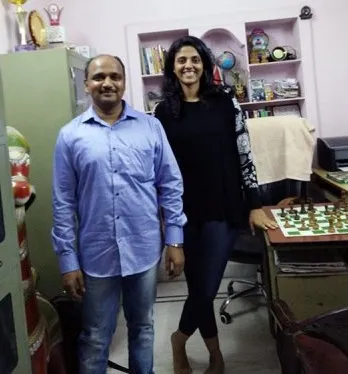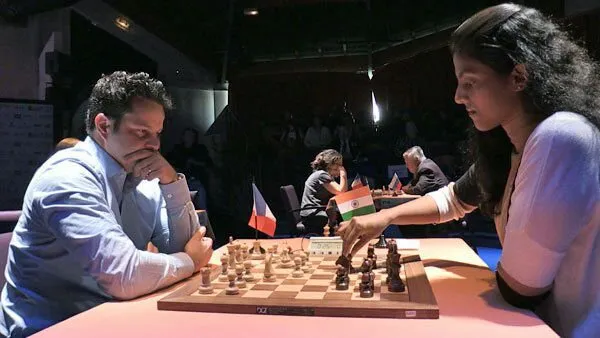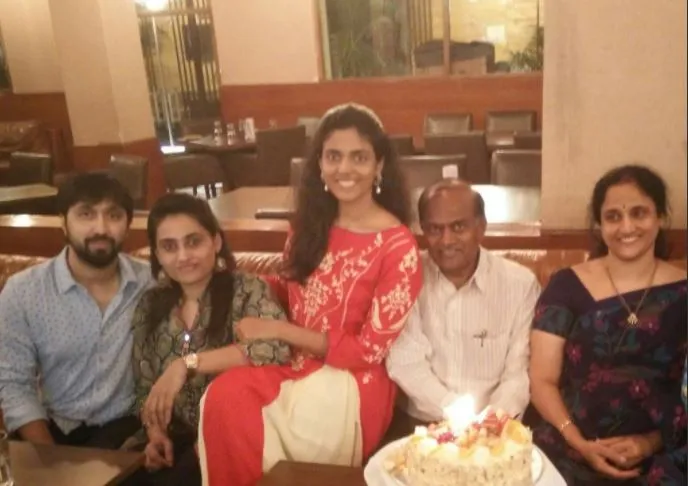Chess grandmaster Harika Dronavalli has been making all the right moves
A freewheeling conversation with Indian chess grandmaster Harika Dronavalli on food, family, travel and, of course, chess.
Chess is a cerebral game, requiring high levels of intelligence, focus and grit. But on the downside it is perceived as a game loved by boring nerds. In India, especially, the bespectacled and calm Viswanathan Anand happened to match the stereotype of the chess geek. Though there is nothing wrong with being a tad sedate, a chess player like Harika Dronavalli is still a welcome change.
Articulate, vivacious, well-dressed and social media-savvy, Harika comes across as somebody who is serious about her career, but also knows how to have fun.

This 26-year-old Arjuna awardee became a Grandmaster (the second Indian woman after Koneru Humpy) in 2011. Harika won the bronze medal in the World Chess Championship in Tehran in February this year, which was incidentally her third bronze at the World Championships.
In 2016, she won the FIDE (Fédération Internationale des Échecs or World Chess Federation) Women’s Grand Prix event at Chengdu, China and she rose from number 11 to number five in FIDE women’s ranking. Harika is currently world number nine on the FIDE rankings and is the only woman after Koneru Humpy to make it to the top 10.
The pint-sized champion
An admirer of Hungary’s legendary Judit Polgar, Harika started playing the game in her childhood. Growing up in Andhra Pradesh’s Guntur, Harika and her sister were encouraged to play several sports, thanks to their father, who is a sports lover. When she was around seven, she happened to attend chess classes. After that, she participated in under-9 national championship and won a medal. What began as fun, soon transformed into a passion.
Harika says, “When I won the silver medal in the World Youth Chess Championship for under-10 girls, that took place in Spain in 2000, I was hooked. Becoming a grandmaster and winning gold in the Women’s World Championship became my ambition.”


NVS Ramaraju was roped in to polish Harika’s game. Ramaraju, who was not a professional coach till then, helped bring in finesse and focus to his protégé and today he also coaches a bunch of youngsters.
Harika’s parents moved to Hyderabad a few years back since her sister and brother-in-law live there, but she doesn’t get to spend much time at home thanks to her hectic travelling schedule. Harika also had to drop out of school, since she, with the support of her family, took the conscious decision to focus completely on chess. She says with a smile,
Three-fourth of my life till date has been taken up by chess.
Eye of the tiger
Training for chess involves constantly exercising one’s brain. Harika says, “It’s strenuous after a few hours and I used to get irritable at training camps. We also must work on our problem-solving skills. If there are 30 moves in a game, it can be played with thousands of permutations and combinations. With the advent of computers, technology helps a lot with the training.”
Physical fitness might not be as pertinent as it is for physical sports, but it’s still quite important. There might be around 10 games in a tournament. To sit and concentrate for several hours at a stretch, it’s important to be physically fit as well.

Chess might not be a viewer-friendly sport, but Harika feels what the sport loses in terms of mass popularity, it gains in the respect people feel towards the game and the players. It might not pay as well as cricket or tennis, but financial security is not an issue for those who do well in the sport. Harika explains,
Most tournaments are all-expense-paid trips. The grand prize for World Chess Championship is €60,000. The lowest prize is €10,000, which a player can win from one Grand Prix Tournament, and in a year there are three tournaments which completes the Grand Prix Cycle. In short, chess is a high paying game if you make it to the top ranks.
Also read: Meet Sonal Kaushal, the voice of Doraemon in India for the past 12 years
Around the world in 80 days
Harika has travelled to more than 40 countries around the world. She finds Russians to be most passionate about chess. Harika’s favourite places to travel to are the Nordic countries–Iceland, Norway and Sweden. She loves to bicycle to the countryside in these scenic places when she is not playing. Food becomes an issue when she is away from home for weeks and, at times, months. So Harika carries her rice cooker along and prepares simple South Indian meals for herself.

Her parents and, more frequently, her grandmother, accompany her for important tournaments. She also travels along with other members of the Indian team. But mostly she has been travelling all by herself since she turned 13.
Harika says with a laugh,
Many times my parents have no idea which country I am in till I call them and update them. But over the years, they have become confident that I can manage on my own. Thanks to my extensive travels, I am highly independent.
Harika is on break at home currently. Her next tournament will be in Abu Dhabi in August. She continues to practice five to six hours every day and uses the rest of the time to spend quality time with friends and family.

Having already won nationals, Asian and Commonwealth games, Harika’s ambition is to become the women’s world champion. The youngest woman Grandmaster from Asia, Harika was also recently adjudged the Chess Player of the Year (2016 and 2017) by The Times of India (TOISA Annual Awards). She was also featured by Verve magazine in 2017 amongst the top 40 popular women sportspersons of the year.
Having beaten current women's world number one Hou Yifan, and drawn against men's world number two Wesley So, Harika is in good form currently. Viswanathan Anand closely follows Harika's progress and performances and has been a mentor of sorts. Harika's idols Judith Polgar and Vladimir Kramnik have spoken highly about her game. So it looks like this lady will continue to make all the right moves on the black and white board.







